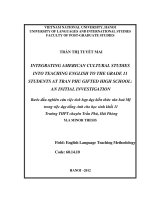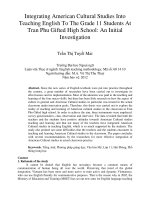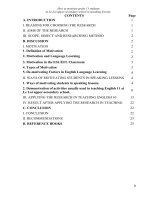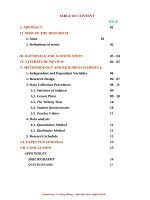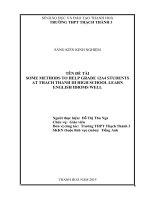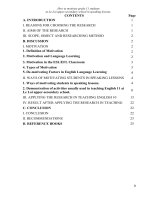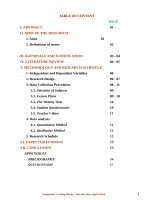The experiences of teaching english writing skill to the grade 10th students of hau loc i high school through writing lessons
Bạn đang xem bản rút gọn của tài liệu. Xem và tải ngay bản đầy đủ của tài liệu tại đây (302.8 KB, 20 trang )
SỞ GIÁO DỤC VÀ ĐÀO TẠO THANH HÓA
TRƯỜNG THPT HẬU LỘC I
SÁNG KIẾN KINH NGHIỆM
THE EXPERIENCES OF TEACHING ENGLISH WRITING
SKILL TO THE GRADE 10TH STUDENTS OF HAU LOC I
HIGH SCHOOL THROUGH WRITING LESSONS
Người thực hiện: Lường Thị Duyên
Chức vụ
: Giáo viên
SKKN thuộc lĩnh vực mơn: Tiếng Anh
THANH HỐ NĂM 2017
0
TABLE OF CONTENTS
PART I: INTRODUCTION........................................................................................2
PART II. CONTENTS................................................................................................3
1.
Pre- writing stage..............................................................................................3
2.
While – writing stage......................................................................................10
3.
Post – writing stage.........................................................................................10
4.
The sample planning lesson............................................................................11
PART III : CONCLUSION......................................................................................16
PART IV. REFERENCES........................................................................................19
1
PART I: INTRODUCTION
***************
Nowadays English has become an international language because it is
widely used in many parts of the world. In the tendency of integration of the
global economy, English is one of the effective communicative tools for
everybody. The role of English is considered to be very important in the fields of
economics, politics, science, culture and education. More and more people want
to learn English for communicating with foreign partners, tourism, study tours,
etc.
In the current Vietnamese high schools, basing on the textbooks designed by
the Ministry of Education and Training, English is taught with four skills and
Language Focus which focuses on grammar and pronunciation. Writing is
considered one of the four language skills (speaking, listening, reading and
writing). Writing skill is an important part of communication. Good writing skill
allows students to communicate their message with clarity.
Next,writing, one of the two productive skills, has always a significant
position in language teaching. Teaching writing includes taking students through
a process — a series of steps — such as brainstorming for ideas, organising and
sequencing them, revising and editing the draft and so on. Nevertheless, how to
teach and learn writing effectively often poses great problems to both teachers
and students. For the teachers of English at high school, writing is considered a
difficult skill to teach.Some of them even ignore teaching writing skills and
focus only on grammar excercises for the exams.Therefore, the teachers who are
currently teaching English, they always think what they should do to make
students’ motivation in writing lessons.
Thanks to the innovation of ways in teaching English,together my own
teaching experience, in the scope of the theme I would like to present : " The
2
experiences of teaching English writing skill to the grade 10 th students of
Hau Loc I High School through writing lessons”. Hopefully, these experiences
could encourage students to write better, develop their writing skills and make
students’ motivation in writing lessons. Moreover, the theme would be shared
with any colleagues who had the same problem or anyone who is interested in
this theme.
PART II. CONTENTS
In the current education curriculum, teaching writing is mainly to
coordinate with other skills to enrich the forms of practice, review students’
knowledge as well as help students get acquainted initially writing style,
structure of writing and using writing activities to communicate some specific
purpose.
Moreover, with the aim of improving students’ abilities in writing. On
English 10 textbook, there are a range of types to practice writing with narrative,
writing letters, giving directions , writing about a story ,describing statistics from
a chart or a table, writing a report or a biography,….. Students will have to
practise writing in many ways.Thus, the stages of teaching writing skill are very
important in writing lessons and they also have significant effects on the students’
writing performance. If students do not prepare well enough they can not write
well, they can not even write anything in their notebooks.The key to successful
writing lessons is that the teachers should carry out well the following stages:
1. Pre- writing stage
Pre-writing is the first step in writing process, pre-writing consists of
gathering ideas and thinking of the order in which they should appear. It should
result in some sort of a product – an outline, a timeline. Thus, pre – writing
activities is considered to be the most important stage in teaching writing skill
and pre-writing activities will help student to get ready to perform the tasks of
3
writing. Additionally, the fact that students’ writing performance can be affected
by teachers’ teaching methods and teachers’ instructions in this stage. If the
teacher conducts this stage successfully, the classroom atmosphere will change
and also the students’ writing performance will be much better.
In this stage T should think of good activities to:
-bexplore the model text
-banlyse the organization and style
-bprepare vocabulary, structures
-benable students to get ideas together
-bplan the outline
Besides, pre-writing can be a social experience. Particularly when students in
the class is responding to the same writing prompt, teacher can ask students to
work individually, in pairs or in small brainstorming groups. Depending on the
writing prompt, teacher can allow groups of students to develop a shared
product. Peer tutoring is also an effective strategy to use in helping students
develop pre-writing skill.
The following examples that I have carried out in this stage:
Example 1: Writing lesson of Unit 4
Topic: Writing a letter of complaint
-Teacher gives two pictures showing two different faces ( one is happy and
another is angry)
-Teacher asks students : 1. How do they feel ?
2. Are they happy or angry ?
-Then teacher can ask students : “ What kind of letter do you write if you feel
angry about something or unhappy with something? A letter of complaint or a
thank- you letter”?
-Teacher introduces : Today we are going to learn how to write a complaint letter
4
-Teacher encourages students to guess the definition and format of a letter of
complaint,then teacher gives:
+Complaint is a kind of formal letter used when you are not happy with a
service, a contract, a course,…
+A letter of complaint usually includes three main parts:
Opening: giving reasons and purposes
Body: showing and explaining the problems logically
Conclusion: suggesting resolutions
-Teacher asks students to work in groups, gives each group one handout and
asks students to read the letter carefully and get the information to fill in the
blanks ( In the handout there is a sample letter of complaint and asks students to
notice the tenses and the words, phrases as well as main parts in this letter )
1.
2.
3.
4.
5.
6.
7.
8.
Address of the sender:…………………………………..
Address of recipient…………………………………….
Salutation……………………………………………….
Reason for writing……………………………………
Complaints………………………………………………
Solution for the prolem………………………………..
Closing………………………………………………….
Signature ……………………………………………….
-After students finish the information, teacher checks and guides students to
make an outline.
Sample outline
Address of the sender
Address of recipient
Greeting : ( Deer,…..)
Body
-State purpose ( I’m writing to complain about…..)
- Give information / evidence to support( First of all, you say that…..)
- Give more information / evidence to support( You also say that…../ In the
advertisement you say that…….)
- Give more information ( To make the mater worse,……….)
5
- Give the evidence you dislike most ( What I hate most your …….is……./
Finally,……….).
- Request action ( To resolve the problem, I require you to ……)
Closing
Sign off : Yours faithfully
* Teacher notices students that complaint is a kind of formal letter students
should use connectors such as: first of all, firstly, secondly, furthermore, to make
the matter worse, finally,…and present simple tense.
- Teacher asks students to open the book, read the advertisement of “ English
For Today Centre”, then teacher gives a hint to students by questions and asks
students to work in pairs to discuss:
What were advertised
-Native teachers ONLY
-No more than 20 students per class
-Free books and cassettles tapes
-All air conditioned rooms
-5.30 – 8.30 pm
What happened to you
-Only one / few native teachers
- About 40 students in class
- Pay for them ( 50.000 or 60.000
dong)
-There is only one ceiling fan/ The
classroom was very hot
-Start late and finish early
Sometimes I waited for half an
hour because the room was not
ready or the teacher arrived late.
- With a range of suggestions and an outline, students will complete the dialogue
in Task 1 and the letter of complaint in Task 2 easily and they might write other
letters of complaint well.
Example 2: Writing lesson of Unit 6
Topic : Writing a confirmation letter
-Teacher asks stuents to work in pairs : Read the two letters and find the
requests in Nga’s letter and the confirmation in Hoa’s.
+ Request : Can you go shopping with me to buy the things we need for the trip
6
+ Confirmation : Certainly, I will help you to prepare everything you need for
the trip. I will be waiting for you at 2.30 p.m.
- Teacher explains the definition of request and confirmation letter:
+ Request is the letter that asks for information or help.
+ Confirmation is the letter that responds to the request. It confirms whether
the help is provided or the information is available or not.
-Teacher explains new words: to pick someone up, to be convenient for,let
someone have an early reply.
-Teacher asks students to read the two letters again and underline:
+ the words and phrases used to give the request and the confirmation
+ tenses
Then students work in groups to make a detail outline
-Teacher calls on some groups to write their outlines on the board
-Teacher corrects students’ outlines and good outlines can be marked
Sample outline
*Date
* Salutation( Dear,…)
* Starting the confirmation politely with delight and repeating request
( I’m glad to hear that …../ Certainly, I’ll help you…………)
* Closing ( I’ll be waiting for you at …../ see you then….)
* Signature
-Teacher notices students that tenses are used: Future simple tense and Future
continuous tense
-Students will use this model and write a confirmation letter easily.
Example 3: Writing lesson of Unit 7
Topic: Writing about the advantages and disadvantages of the mass
media.
After the exciting warm up activity: answering 3 questions:
1.What are some kinds of mass media?
2.Which one is the most popular?
7
3.What are the advantages and disadvantages of television?
- Teacher leads in the lesson and asks students to skim the model text, identify
the advantages and disadvantages of T.V and underline some new words and
new structures which are used in the model text.
-Teacher checks and gives tructures and new words :
+ help / encourage S.O to do sth: help us to learn, encourage us to buy.
+ make S.O / sth + adjective: make things memorable, make us aware of, make
us passive / violent.
+ 'memorable (adj) : easy to remember
+ en'joyable (adj) : pleasant
+ popu'larity (n) : the noun of " popular"
+ be a'ware of (v) : realize
+ brain (n) : part of the body inside the head
+ 'violent (adj) : fighting, killing, etc.
+ inter'fere with (v) : get in the way of something
-Teacher asks students to talk about the advantages and disadvantages of TV. Use
the new structures they have learnt.
-Then teacher devides the class into 6 groups and asks students to work in
groups: Give the advantages and disadvantages of :
+ Listening to radio
+ Reading newspapers
+ Using the Internet
- During students dicuss, teacher walks around the class to help students if they
need. When the time is over, teacher calls on some groups to present their ideas
in front of the class and asks for comments from other groups.
-Teacher corrects and gives:
Suggested answers
8
Advantages
Listening to - Make people happy/ life easier.
radio
-Get
updated
news
infofmation
and
enlarger
broaden
knowledge
Disadvantages
- It is rather boring because
and we can't see anything.
or - The programmes are not
and very vivid, there are no
understanding
games and films, etc.
- Listen to music, dramas, etc.
-Share opinions/experiences
- It is not harmful to people's
eyes.
-Get information on many fields: -Newspaper
Reading
culture,art,business,…
may
not
be
available everywhere
newspapers -Learn more about the word and -There is no information until
to know and see many new things
the next edition
-It is cheap
-The pictures are not moving.
Using the
-Relax and entertain
- Make people happy/ life easier.
Internet
-Get
the
largest
source
-Harm people eyes.be short-
of sighted.
information and entertainment .
-Make people passive and
-Relax by watching films or influence on the way people
football matches, listening to think or people’life.
music on-line or chatting to
friends or relatives.
-It
can
be
dangerous
because you can be exposed
to harmful websites
Students might be successful in writing this kind of exercise because there were
a large number of these expressions and students can choose any kind of mass
media and write the text.
9
2. While – writing stage
This stage is for developing writing skill, students can write individually, but
teacher should encourage collaborative writing ( work in pairs or in a small
group to write the first draft).While students are writing, teacher goes round the
class to see how well students work and whether they need some help.
Especially, teacher should pay more attention to less – active or quiet students
and encourage them to work.
3. Post – writing stage
The activities in this stage help students much in gaining confidence when
writing and also help them become more and more interested in their writing
lessons.
Therefore, after students
finish
their writings, there are many ways of
responding to students ’writien work. Teacher can choose from the following
techniques:
+ correction
+ sharing and comparing
+ exhibition
Besides, teacher should take the lead in this process, and offer direct, explicit,
and frequent feedback. Students should be active in self – studying, peer and
group cooperation. Feedback from both a teacher and students help to develop
their writing style.
4. The sample planning lesson
ENGLISH 10
Period 68
UNIT 11: NATIONAL PARKS
D : WRITING
I. Objectives
10
1. Education Aims
- Students can write a letter of acceptance or refusal.
2. Knowledge
a. General knowledge:
- A letter of acceptance or refusal.
b. Language:
- Language used to write an informal letter.
- Expressions: "Yes, I'd like/love to."," I'm afraid I can't come because...?",
etc.
3. Skills
- Reading: read the expressions in task 1 to fill the blanks of the incomplete
letters.
- Speaking: work in pairs to rearrange the sentences to make a letter of
acceptance.
- Writing: write a letter of acceptance or refusal.
II. Anticipated problems
- Students may find it difficult to get ideas as well as to choose suitable
expressions to write a letter of their own.
III. Teaching Aids
- board, textbook, chalk,handouts.
IV. Procedures
Teacher's activities
1.Warm up:( 5 mins)
Competition game-Network
Students' activities
- Listen to the teacher.
- Prepare a handout with a network of -Groupwork
the word “ letter”.
-Ask sts to work in goups and - Listen to the teacher carefully.
11
complete the network with different
types of letter they know.
-The winner will be the group with
the quickest and correct answers.
-Check and give correct answers.
- Copy down the words into their
2. Before you write:( 18 mins)
notebooks.
Aims:
- Do the task in pairs.
+ to get sts to read the expressions in - Share their answer with their friends.
the table and to do task 1 and task 2.
- Present their ideas.
+ to get sts to give outline.
1. Accepting: Yes, I'd like/love to.
Task 1
2. Refusing: I'm afraid I can't come
- Introduce the topic of the lesson: because (or I’d love to, but …………)
Write a letter of acceptance or 3. Accepting: I'd be delighted to ( or I’d
refusal.
love to…)
- Introduce some new words:
+ a'cceptance (n): the noun of - Listen to the teacher.
"accept"
+re'fusal (n) : the noun of " refuse"
+ dec'line (v) : refuse sth offered
( politely)
- Ask sts to listen and repeat and then
copy down these words into their
notebooks.
-Whole class
- Ask sts to read the expressions in the
table, then work in pairs to complete
three reply letters by using the
expressions in the table. For each
12
blank they can have more than
one answer.
- Move around to help if necessary.
-Call on some students to write their
answers on the board and call for peer - Work in groups
corrections.
-Copy down
- Comment and give the correct
answers.
*A letter of acceptance
Outline
Example
-Salutation
-Dear Chi,
* Ask sts to discuss the features of
a letter of acceptance or refusal.
Sts answer some questions:
+ What is the similarity between the
three letters?
+ What is the similarity between letter
one and three?
+ How is letter two different from the
-Thanking
for - Thanks for your
invitation
-Starting
invitation
the - I’d like to come
acceptance
politely
with delight
-Closing
other two?
- How about
+ Why did the writer of letter two
meeting at
refuse the invitation?
-Remind sts that:
-Signature
gate at 8.30?
+ to write a letter of acceptance,
-Yours,
firstly, sts should thank their friends
for the invitation. Then they use one
of the ways of accepting to say they
agree to join their friends.
+ to write a letter of refusal, firstly, sts
should thank their friends for the
the school
Lien
*A letter of refusal
Outline
Example
Salutation
-Dear David,
-Thanking
for - Thanks for
13
invitation.Then they use one of the
invitation
ways of refusing the invitation to say
-Starting the refusal
that they can’t join their friends. Sts
politely with regret
your note
- I’d love to
should remember to give out the
come.But
reason for refusal as well.
I’m afraid
-Ask sts to use the letters in the task
I can’t
as models.
because my
- Comment and give the correct
father
models.
has been ill
since yesterday
-Closing
and
Task 2
I have to look after him
- Remind sts of the letter Nam wrote
-Signature
-Let’s go
to Lam to invite Lam to spend a
another time.
weekend with him. And now Lam
-Yours,
writes a letter of acceptance Nam's
Mike
invitation.
- Ask sts to work in pairs to rearrange
the sentences into a letter.
- Call on some pairs to read the letter
-Work in pairs
- Present their ideas:
1.d
2. e
3. c
4. a
5. f
6. b
out loud and ask other pairs to listen - Listen to the teacher and copy down.
and give feedback.
- Comment and give the correct order. - Read the requirement.
- Listen to the teacher.
3. While you write:( 12 mins)
Aims: Sts practise writing a letter of - Do the writing task.
acceptance or refusal.
- Ask sts to read the requirement of
14
task 3.
-Pair work and whole class
- Ask them to pay attention to their
- Listen to the teacher
outlines
- Ask sts to work the letter
- Copy a sample letter.
individually.
Dear Binh,
- Move around to conduct the
It's lovely to hear that you are going for a
activity.
picnic to Cuc Phuong National Park next
4. After you write:( 8 mins)
weekend. Thank you for inviting me to join
Aims: to get feedback and check sts' you but I'm afraid I can't come.
work.
My English friend, Maria, is coming to
-Ask sts to exchange their writing
Vietnam next weekend and I have promised
with another student for peer
to cook her some of our traditional dishes
correction
on Saturday morning. After that, I'm going
-Goes around and collects mistakes
to take her to some famous places in Hai
and errors.
Duong.
-Collects some writings for quick
feedback.
I hope that you will have a wonderful day
in Cuc Phuong. Remember to show me the
-Write sts’typical errors on the board photos you take in Cuc Phuong whem you
and elicits self and peer correction.
get home.
-Give sts a sample letter.
Yours,
Nam
5.Consolidation: (1min)
- Listen and take note.
-Ask sts to summary the main points.
-Do at home
6. Homework: (1min)
-Ask sts to rewrite their own writing
at home.
15
PART III : CONCLUSION
Some innovation of teaching methods and some appropriate strategies
were applied in my lessons. Most of students were interested in teaching
lessons. They were willing to taking part in activities I asked and worked more
effectively in the lesson. Moreover, I have stimulated my students’ interests in
creative writing and develop their writing skills.
Real numbers:
Academic year: 2015- 2016:
Grade Total
Excellent
Good
Number %
Numbe
Average
Under average
students
%
r
Numbe
%
r
Numbe
%
r
10A1
43
5
11.6
10
23.2
22
51.2
6
14
10A4
41
4
9.7
9
21.9
24
58.7
4
9.7
Academic year: 2016- 2017:
Grade Total
Excellent
Good
Number %
Numbe
Average
Under average
students
11A1
43
7
r
16.2 15
11A4
41
6
14.6 14
%
Numbe
%
Numbe
%
6.9
4.8
r
34.8 18
42.1
r
3
34.1 19
46.5
2
16
During the teaching process in Hau Loc I high school, I have made many
efforts to study, explore, share experiences from colleagues, drawn from the
experiences of my own teaching. I have got the experiences of teaching English
writing skill in high shool. However, this theme still has some limitations, it is
given out as a contribution to the knowledge of all teachers and students of
English in their teaching and learning.
I hope that this theme would be of some value to both teachers and students
in their language teaching and learning process.
I would like to thank.
The confirmation of the principle
Thanh Hoa, May 25th 2017
I promise not to have copied
Signature
Lường Thị Duyên
17
PART IV. REFERENCES
**************
1. Byrne, D. (1988). Teaching Writing Skills. Longman
2. . Downs,M.(2000). Increasing student Motivation. Teachers’ Edition 4: 8 –
13
3. Gebhard and Oprandy.(1999).Language Teaching Awareness: A guide to
exploring Beliefs and Practices. CUP
4. Harmer,J.(2001). The Practice of English Language Teaching (3 rd ed).
Essex: Longman
5. .Leki,I.(1976).Academic Writing, Techniques and Tasks: ST.Martin Press,
New York.
6. Raimes,A. (1993). Teachniques in Teaching Writing. OUP.
18
19

